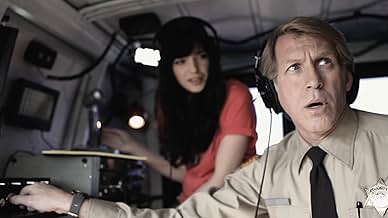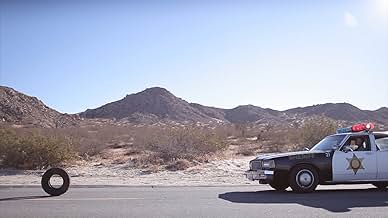A homicidal car tire, discovering it has destructive psionic power, sets its sights on a desert town once a mysterious woman becomes its obsession.A homicidal car tire, discovering it has destructive psionic power, sets its sights on a desert town once a mysterious woman becomes its obsession.A homicidal car tire, discovering it has destructive psionic power, sets its sights on a desert town once a mysterious woman becomes its obsession.
- Awards
- 5 wins & 3 nominations
- Black Woman
- (as Cecilia Antoinette)
- Zach
- (as Remi Thorne)
- Cleaning Lady
- (as Tara O'Brien)
- Cop Luke
- (as Pete Di Cecco)
- Cop Denise
- (as Courtenay K. Taylor)
- Director
- Writer
- All cast & crew
- Production, box office & more at IMDbPro
Storyline
Did you know
- TriviaMade mostly with practical special effects - very little CGI was used.
- GoofsWhen the tire is watching Nascar on the TV, the sound we hear is from a different series of motor-racing; possibly Formula 1.
- Quotes
[first lines]
Lieutenant Chad: In the Steven Spielberg movie "E.T.," why is the alien brown? No reason. In "Love Story," why do the two characters fall madly in love with each other? No reason. In Oliver Stone's "JFK," why is the President suddenly assassinated by some stranger? No reason. In the excellent "Chain Saw Massacre" by Tobe Hooper, why don't we ever see the characters go to the bathroom or wash their hands like people do in real life? Absolutely no reason. Worse, in "The Pianist" by Polanski, how come this guy has to hide and live like a bum when he plays the piano so well? Once again the answer is, no reason. I could go on for hours with more examples. The list is endless. You probably never gave it a thought, but all great films, without exception, contain an important element of no reason. And you know why? Because life itself is filled with no reason. Why can't we see the air all around us? No reason. Why are we always thinking? No reason. Why do some people love sausages and other people hate sausages? No fuckin' reason.
Cop Xavier: [honks the horn] Come on! Don't waste your time explaining that garbage. Let's go!
Lieutenant Chad: Just a minute. Let me finish.
[looks back at the audience]
Lieutenant Chad: Ladies, gentlemen, the film you are about to see today is an homage to the "no reason" - that most powerful element of style.
[pours his glass of water on the ground before getting back into the trunk of the police car]
- Crazy creditsDuring the closing credits, the opening monologue by Lt. Chad is shown from a different angle that shows the speech is for the "in-film" audience, and not the "theater" film audience.
- ConnectionsFeatured in Trailer Failure: Rubber, Madea, Shotgun (2011)
- SoundtracksJust Don't Want To Be Lonely
Lyrics and music by Vinnie Barrett, John C Jr Freeman and Bobby Eli
Performed by Blue Magic
For one, Rubber is more of an experiment than it is a film. Yes, the idea of the tire rolling around and killing people (mostly by making their heads explode in violent messes) is joyfully and bewilderingly hilarious at first. But once you get past the initial shock value of something so simple yet so ridiculous, you need to begin to wonder what writer/director Quentin Dupieux's intentions were with making this film. Did he want to create something so out of this world crazy, that the sheer idea of a killer tire becomes the film's main selling point? I was immediately intrigued when I first heard the idea, but as the film moved along, I found myself more dumbfounded than anything into thinking it was a good idea to make a whole movie revolving around a melancholic tire.
Dupieux adds in a bit of self-awareness, by adding an audience into the picture, who watch Robert's actions from a far via binoculars. Their addition to the film is never explained, nor are their actions or what happens to them as the film goes on. They simply exist to watch what Robert does (his actions acting almost as a film within a film), offer their opinions (which are oddly similar to that of the real audience) and help Dupieux break the fourth wall. The opening of the film has Stephen Spinella's Lieutenant Chad rhyme off to the audience (both within the film, and watching the actual film) how a good chunk of Hollywood films have elements within them that exist for no reason. And the audience within the film seems to have only been added to help move along this theory and agenda. It is a baffling and odd choice, one that left me confused after I first became aware of what was going on. It offers a few laughs here and there, but much like the idea that drives the film, it is just weird and absurd.
Except that seems to be the point of the whole project behind Rubber: to create a silly film, based on a silly idea, and try to alienate the audience watching it. It takes itself deadly serious, but deep down, it does know it is silly. But it also knows it is otherworldly too. It does what few films do, and engages the audience's thinking and relative scope of reality. It bends the schematics of the filmmaking medium, and what we do and do not know about it, and alters and modifies it to its own liking. Of course, since the film was made in France, it could be deemed an offshoot or a film made in the image of its brethren of the French New Wave. But at the same time, it may just simply exist to play with what we know, and give us something wild and unlike anything we have ever really seen before.
But being unique is a bit of a double edged sword in the case of Rubber. For all the wacky and odd choices it makes in its attempt to be unique, it also ends up being incredibly boring and inane. As hinted at before, after you get past the idea of what Robert can do, there really is nowhere else for the film to go. A synopsis suggests he is obsessed and fascinated by a mysterious woman named Sheila (Roxane Mesquida). But she only appears sparingly in the 80-minute film, and she never really has a chance to make an impact at all. Perhaps Robert is seeing something we as an audience have missed? For such a short running time, Rubber runs out of a lot of ideas a bit too fast, and by the time the deranged ending takes place, it stops making any sense at all, either in our reality or the reality the film sets up for itself.
While I cannot say that I was anything but disappointed in the film, I also have to contend that its power lies in the unexpected. There is no proper way to prepare yourself for what you will see, and watching the trailers will only confuse you further. There really could have been any number of extensive things Dupieux could have added to the film to make it better, but listing them off would be just as silly as attempting to fully explain what he was trying to say.
There will be some people who will say I just did not understand Rubber, but after carefully considering the elements that make up the film, there really is no way to explain or even attempt to decipher what it all means. Dupieux put this enigmatic movie together for fun, to toy with the audience and with film conventions. It is an experiment first, and a film second. Some may find it brilliant, some just baffling. I will stick with being confused and disappointed. But at least the film managed to maintain being entertaining, even if its inanity and silliness became a bit much.
6/10.
(This review also appeared on http://www.geekspeakmagazine.com).
- DonFishies
- Mar 16, 2011
- Permalink
- How long is Rubber?Powered by Alexa
Details
- Release date
- Country of origin
- Official sites
- Language
- Also known as
- Bánh Xe Ma Quái
- Filming locations
- Four Aces Movie Ranch - 14499 E Ave Q, Palmdale, California, USA(Sheila's car stalled, tire bumped by pickup truck)
- Production companies
- See more company credits at IMDbPro
Box office
- Budget
- $500,000 (estimated)
- Gross US & Canada
- $100,370
- Opening weekend US & Canada
- $16,346
- Apr 3, 2011
- Gross worldwide
- $101,729
- Runtime1 hour 22 minutes
- Color
- Sound mix
- Aspect ratio
- 1.85 : 1
Contribute to this page



































